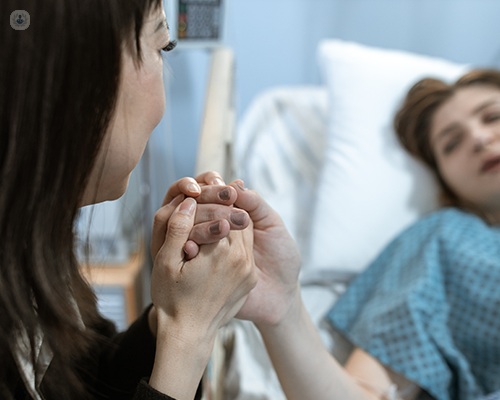Will gallstones make my gallbladder burst?
Autore:A burst gallbladder is a serious and life-threatening condition, but there are ways to minimise this risk, and even prevent it.
Mr Deepak Hariharan is a specialist in the surgical management of gallstones and the gallbladder. He shares his expert knowledge with you so that you understand how a burst gall bladder occurs, what the early and late symptoms are and how it can be prevented. He also provides a brief explanation of surgery and recovery.

How can gallstones cause the gallbladder to burst?
The gallbladder is an organ that is shaped like an ovoid bag. It acts as a storehouse of concentrated bile released on demand to digest food. It lies at the underside of the liver and is attached to the tubes that drain the liver (the right and left bile ducts join these to form the common hepatic duct and bile duct).
The concentrated bile precipitates in time and forms gallstones. The gallstones obstruct the outflow from the gallbladder (called the cystic duct) and prevent the free flow of bile from the gallbladder. In time, the pressure builds within the gallbladder and the bag in itself distends. This results in an increase in pressure along with a reduction of blood supply to the gallbladder. A superadded infection along with reduction of blood supply leads to perforation or bursting of the gallbladder wall.
Depending on where the break occurs in the wall of the gallbladder, the burst can occur into the liver (which leads to a liver abscess) or the wall may perforate into the abdominal lining (causing leakage of bile), this soils the abdominal cavity causing biliary peritonitis.
Occasionally, a single large stone obstructing the cystic duct erodes into the bile duct or forms abnormal communication (fistulas) with adjoining bowel (duodenum, colon rarely stomach).
What are the early and late symptoms of a burst gallbladder?
Burst gallbladder (or perforation in the gallbladder) is a serious and potentially life-threatening complication of gallstones.
The burst or perforation as an event is often preceded by early symptoms such as:
- pain in the upper abdomen (mostly on eating fatty food), often underneath the right rib cage
- fullness or associated bloating in the upper abdomen (which may have been ignored as indigestion)
The alarm signs for burst or perforation often include:
- fevers (swinging pyrexia)
- excruciating pain that can’t be controlled by simple tablets
- jaundice
- excessive vomiting
- the distension of the abdomen
How can a burst gallbladder be prevented?
A burst/perforation of the gallbladder may be prevented by being aware of the possibility of developing gallstones (middle-age women are more prone to develop gallstones and recognising the early symptoms associated with gallstones. Once you recognise the symptoms, it is essential to seek specialist medical help. The primary care physician on clinical assessment may advise or organise an ultrasound scan of the liver and gallbladder. This is the most sensitive and appropriate test for gallstones.
Upon confirmation of uncomplicated symptomatic gallstones, patients ought to seek specialist surgical referral or an appointment with surgeons to consider having laparoscopic (keyhole) gallbladder removal surgery ( cholecystectomy ). This remains the gold standard treatment for cases where early symptoms are noted and gallstones are detected by an ultrasound scan. This surgery (if undertaken early in the course of gallstone disease) can prevent life-threatening complications such as burst or perforation of the gallbladder.
How does surgery fix a burst gallbladder?
Occasionally, patients who have ignored early gallstone symptoms find themselves extremely ill and requiring emergency medical help and admission to the hospital.
After the initial assessment and clinical stabilisation, dedicated scans (e.g. CT scan or MRI) may be performed to determine the degree of the burst or perforation and where exactly it has occurred. Treatment strategies are tailored to deal with the patient’s individual situation e.g. (liver abscess, fistulation, biliary peritonitis etc.).
The treatments are designed to remove the source of infection using a combination of radiologically directed drainage procedures and staged surgery (an operation performed in two or more parts) or immediate emergency surgery to remove the gallbladder. The surgery may be undertaken as an open surgery or a laparoscopic (keyhole) procedure. The most suitable option for you depends on the clinical situation, the surgeon’s skill and the available expertise. The duration of the procedure depends on each patient’s situation but may take a couple of hours.
How long does it take to recover from gallbladder surgery?
The time spent in hospital post-surgery can vary between one to five days. Patients who undergo open surgery spend a longer time in the hospital. This is mostly a result of post-operative pain from the cut, which is mostly underneath the right rib cage. Once patients are eating and moving independently, they are discharged and can return home.
Patients are encouraged and supported in undertaking light activities at home so that they can return to normalcy. This period can vary from two to six weeks depending on:
- the clinical fitness level of the patient before surgery.
- the type of surgery that will be undertaken (keyhole or open surgery).
- the avoidance of complications from surgery.
Patients receive a follow-up appointment in an outpatient clinic to ensure they have fully recovered. They will receive a report from the histopathology (a microscope examination of cells), which is routinely performed on the removal of gallbladder. Once the patient has been reassured that they are well, they will be discharged from surgical follow-up.
Mr Deepak Hariharan regularly performs gallbladder and other complex surgeries for benign and cancer hepato-pancreato-billiary conditions. Click here to learn how he can assist you.


